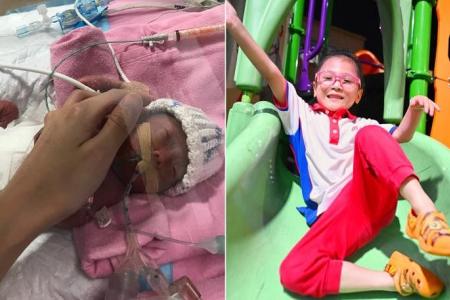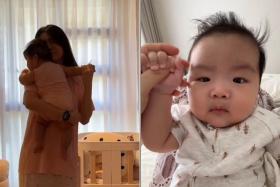S'pore baby born at 22 weeks defies the odds, now a healthy five-year-old
Five-year-old Chelsea Kiew likes to play with Lego, loves to eat cheese sticks, and one of her favourite places to visit is the zoo.
She is just like any typical kindergarten child, said her father, 35-year-old business analyst Raymond Kiew.
But Chelsea’s birth in 2018 was anything but normal.
She was born extremely premature at 22 weeks – or over five months – of pregnancy, and is the only baby born in Singapore at 22 weeks in the past decade to have survived.
A baby is considered full term from the 37th week onwards.
Dr Tan Pih Lin, a senior consultant at the department of neonatology at KK Women’s and Children’s Hospital (KKH), said that globally, less than 2 per cent of babies are born at 22 weeks.
Dr Tan said of her patient: “Chelsea is the only survivor at 22 weeks gestation in Singapore, which makes it an extremely rare and unique case.”
Chelsea’s mother, Madam Lin Hsiao Chi, a housewife in her 30s, said her daughter was as small as a 100Plus bottle, referring to the isotonic drink bottle, when she was born.
To be exact, she weighed 510g and measured 28cm in length at birth. Newborns usually weigh between 2.5kg and 3.5kg.
Dr Tan said that Chelsea’s chances of survival were close to zero at birth.
She went through a slew of life-sustaining treatments and spent 166 days, or more than five months, in hospital before she was discharged.
Mr Kiew said that Chelsea, who turns six in May 2024, is very fortunate as she has no major complications from her premature birth.
She has a small hole in her heart, which requires regular check-ups.
Mr Kiew said: “We don’t see any impact from the hole in her heart. She can still run about, take part in all activities, depending on her mood.”
But she is on the smaller side – weighing about 15kg and standing at 1.05m tall.
Dr Tan said Chelsea is healthy and growing well. The girl has no medical or health issues apart from hereditary astigmatism, myopia and allergic rhinitis.
On Jan 9, Minister of State for Home Affairs and Social and Family Development Sun Xueling said that only one baby born at 22 weeks in Singapore in the past decade survived. Ms Sun said this at the second reading of the Stillbirths and Births (Miscellaneous Amendments) Bill.
Ms Sun did not name the child, whom she described as a “miracle baby”, but added that such cases are extremely rare. The Straits Times found out that the child is Chelsea.
Under the Bill, the definition of stillbirth will refer to the death of a baby born after the 24th week of pregnancy. This is up from after the 22nd week now.
The change comes after doctors expressed concern that the threshold of 22 weeks of pregnancy may be misinterpreted as an indication of foetal viability, which refers to the ability of a baby born prematurely to survive outside the womb.
This may cause confusion among parents facing difficult and important decisions about medical interventions for their unborn child.
Ms Sun said that local medical and scientific evidence points to 24 weeks of pregnancy as the threshold for foetal viability.
She said reviews by the Ministry of Health in 2018 and 2022 concluded that the survival rate of a premature baby born at 22 weeks is close to zero, while the foetal viability of babies born at 24 weeks is about 50 per cent.
About 8 per cent of all babies born in 2022 were premature babies, defined in the Report on Registration of Births and Deaths 2022 as those born at or before 36 weeks.
A total of 112 babies – or 0.3 per cent of all babies – were born at under 28 weeks in 2022, the report published by the Immigration and Checkpoints Authority stated.
Chelsea’s birth came as a shock to her parents. She is their only child.
Madam Lin suddenly went into labour at home and her husband helped to deliver the baby, guided by emergency medical services staff over the phone.
Recounting the experience, Madam Lin said: “I was petrified. But when I heard her crying, at least I knew she was alive.”
Both mother and daughter were rushed to KKH, where doctors told them the prognosis for Chelsea was very poor. She needed 100 per cent oxygen and maximum ventilator support to help her breathe.
There were a few times during her hospital stay when doctors thought she might not survive, but she pulled through.
Mr Kiew said: “We visited her every day, told her stories and encouraged her to believe in herself and explore the world. We believe such support is crucial for premature babies.”
Dr Tan said that most babies born at 22 weeks show little or no signs of life at birth, and especially so for those born at home – referring to spontaneous deliveries, where no drugs or other techniques are used to induce labour.
But Chelsea was extremely active at birth, with a good heart rate, among other health indicators, she said.
Her hospital bill eventually came up to $330,000. But the Kiews paid about $3,000 with MediSave, after subsidies and MediShield.
Dr Tan said Chelsea had chronic lung disease, which required respiratory support for nine months after her discharge. She later recovered and grew out of the condition.
She was also fed with a feeding tube for a period of time, Mr Kiew said.
Dr Tan said the girl has not had any health nor medical concerns in relation to her premature birth.
Her parents said Chelsea is an independent child, who likes to draw, sing and dance.
“She’s very sensible, like she can see when I come back from office looking tired, and she’ll cover me with a blanket,” Mr Kiew said.
“She’s a bit of an introvert. She will spend a lot of time observing you before she will play with you.”
Get The New Paper on your phone with the free TNP app. Download from the Apple App Store or Google Play Store now


